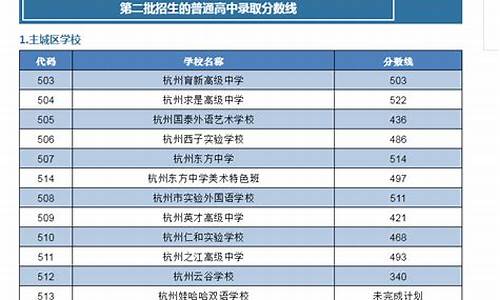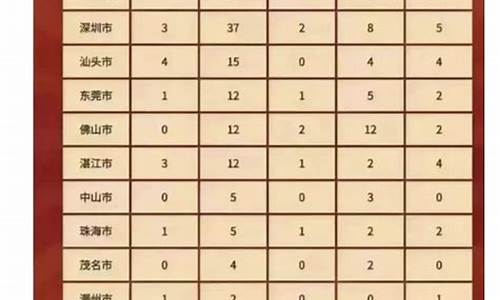您现在的位置是: 首页 > 高考调剂 高考调剂
被名牌大学录取的英语_被名牌大学录取英文翻译
tamoadmin 2024-06-18 人已围观
简介1.他刻苦学习,以至于可以考上名牌大学(英语翻译)2.诚心请教几个英语中的问题!3.托福得上多少分才能被名牌大学录取?4.我想问一个关于英语的问题 Firstly, we‘re more or less pushed by our teachers to learn to get a great grade at high school. That‘s to say, it‘s not initi
1.他刻苦学习,以至于可以考上名牌大学(英语翻译)
2.诚心请教几个英语中的问题!
3.托福得上多少分才能被名牌大学录取?
4.我想问一个关于英语的问题

Firstly, we're more or less pushed by our teachers to learn to get a great grade at high school. That's to say, it's not initiative. On the contrary, on the college campus, no one would push us to study, except our-self.意思是:首先,在高中我们或多或少都是被老师逼着去学习来取得好的成绩。也就是说,并不是积极主动的。相反,在大学校园里,没人会逼我们去学习,除了我们自己。
What's more, at high school, our teachers explained almost every word and text specific, but our new teachers would not explain as detailed as high school teachers.
Secondly, at high school, we're only permitted to study science subject or humanities subject, and we would study extremely hard to get more marks which made us stay up. Worse still, in spare time, we never did some sporting and relaxed ourselves so as to not fall behind in the study. However, in college, we're allowed to learn what we're interested in. Besides, when we're free, we always take part in great variety activities which makes us obtain different ability.
Last but not least, in high school, we aim at being admitted to a famous university. But in college, we are not only study but also to establish a relationship with students to get along well with others.
To conclude, although our lifestyle has changed a lot, we still need more self-control and self-awareness in college. We can't only focus our energy on computer games; we should not kill the time. Instead, we had better take advantages of the time to obtain the ability to confront the challenge. Only so, we will become more competitive and we can have a bright future.
翻译:
在高中,我们的老师几乎都是逐字逐句地解释,但是我们现在的新老师并不像高中老师那样解释得那么详细。
其次,在高中,我们只要学习文科或者理科,为了得高分我们会很努力地学习,甚至经常熬夜。而且,在业余时间,为了不在学习上落后我们从来没有做一些运动来放松自己。然而,在大学里,我们可以学我们感兴趣的。此外,当我们有空的时候,我们经常参加各种各样可以提高能力的活动。
最后但并非最不重要的,在高中时,我们的目标就是被名牌大学的录取。但在大学,我们不仅仅要学习还要和学生们建立友好关系,与他人好好相处。
最后,虽然我们的生活方式发生了很大的变化,但是在大学里我们需要更多的自我控制和自我意识能力。我们不能只把精力集中在电脑游戏中;我们不应该消磨时间。相反,我们最好好好利用时间来获取面对挑战的能力。只有这样,我们才会变得更有竞争力,才会有一个光明的未来。
他刻苦学习,以至于可以考上名牌大学(英语翻译)
It's about half a year since I entered the college, and I find the way of study in college is different from the study in high school. Next I will share my opinions with you.
Firstly, we're more or less pushed by our teachers to learn to get a great grade at high school.?
That's to say, it's not initiative. On the contrary, on the college campus, no one would push us to study, except our-self. What's more, at high school, our teachers explained almost every word and text specific, but our new teachers would not explain as detailed as high school teachers.
Secondly, at high school, we're only permitted to study science subject or humanities subject, and we would study extremely hard to get more marks which made us stay up. Worse still.
in spare time, we never did some sporting and relaxed ourselves so as to not fall behind in the study. However, in college, we're allowed to learn what we're interested in. Besides, when we're free, we always take part in great variety activities which makes us obtain different ability.
Last but not least, in high school, we aim at being admitted to a famous university. But in college, we are not only study but also to establish a relationship with students to get along well with others.
To conclude, although our lifestyle has changed a lot, we still need more self-control and self-awareness in college.
We can't only focus our energy on computer games; we should not kill the time. Instead, we had better take advantages of the time to obtain the ability to confront the challenge. Only so, we will become more competitive and we can have a bright future.译文:
自从我进入大学已经半年了,我发现大学的学习方式和高中时不一样的。下面我会和你一起分享我的想法。首先,在高中我们或多或少都是被老师逼着去学习来取得好的成绩。也就是说,并不是积极主动的。
相反,在大学校园里,没人会逼我们去学习,除了我们自己。而且,在高中,我们的老师几乎都是逐字逐句地解释,但是我们现在的新老师并不像高中老师那样解释得那么详细。
其次,在高中,我们只要学习文科或者理科,为了得高分我们会很努力地学习,甚至经常熬夜。而且,在业余时间,为了不在学习上落后我们从来没有做一些运动来放松自己。然而,在大学里,我们可以学我们感兴趣的。
此外,当我们有空的时候,我们经常参加各种各样可以提高能力的活动。最后但并非最不重要的,在高中时,我们的目标就是被名牌大学的录取。但在大学,我们不仅仅要学习还要和学生们建立友好关系,与他人好好相处。
最后,虽然我们的生活方式发生了很大的变化,但是在大学里我们需要更多的自我控制和自我意识能力。我们不能只把精力集中在电脑游戏中;我们不应该消磨时间。相反,我们最好好好利用时间来获取面对挑战的能力。只有这样,我们才会变得更有竞争力,才会有一个光明的未来。
诚心请教几个英语中的问题!
结构换一下就可以了。这个句子表示 因果关系
He studies so hard that he can go to a famous university.
也可以是:
Because/As he studies hard,he can go to a famous university .
#仅供参考#
托福得上多少分才能被名牌大学录取?
一.Whether sleeping at noon is a serious problem to me。sleeping动名词作主语。
二.Both he and her are not students他和她都不是学生。不存在“Not both he and her are students.”这种说法。应该是Neither he nor her is student。
三.得看具体的名词,in the evening,at night在晚上,都是固定搭配We had a good time that night这句因为night前有that所以不加at。
四.
看看以下解释你会弄懂倒装:
1. 完全倒装
1) 完全倒装即把整个谓语放到主语之前(是整个谓语动词,而非助动词)。
例如:In came the teacher and the class began. (老师走了进来,然后开始上课。)
2) there引出的完全倒装句:除了最常见的there be句型以外,there还可以接appear, exist, lie, remain, seem to be, stand等,一般都译成"有"的含义,构成完全倒装句。
例如:There appeared to be a man in black in the distance.(远处有个穿黑色衣服的人。)
3) 由地点和时间副词引出的完全倒装句:以地点副词here, there和时间副词now, then 开头,后面的动词是be, come, exist, fall, follow, go, lie, remain, seem, stand等,而主语又是名词时,构成完全倒装句。
例:Under that tree sits a beautiful girl.(那棵树下坐着一位美丽的姑娘。)
例:_________ from the tenth floor when the policeman pointed his pistol at him.
A) Jumped down the burglar B) Down the burglar jumped
C) The burglar jumps down D) Down jumped the burglar
答案是D) Down jumped the burglar。因为地点状语Down位于句首应该用完全倒装,整个谓语动词应位于主语之前。C) The burglar jumps down虽然是自然语序,但时态错误,应该用和时间状语从句一致的过去时,而不是现在时。
注意:
1) 在here, there引出的倒装句中,当主语是普通名词时用完全倒装句,但当主语是代词时,就要用部分倒装句。
例:Here comes the postman!(邮递员终于来了!注意实意谓语动词位于主语之前。)
Here we are.(我们到了。注意系动词位于主语代词之后。)
2) 注意正语序和倒装语序的语气、意义是区别:
例:Here is the picture I love.(这正是我所喜爱的画。)
The picture I love is here.(我所喜爱的画在这里。)
3) 当主语是代词,谓语是系动词,表语是说明性的词、词组和定语从句时,可以使用完全倒装句,起强调作用。
例:Lucky is he who has been enrolled into a famous university.(他真幸运,被一所名牌大学录取了。)
2. 部分倒装
1) 部分倒装即只把谓语的一部分(如助动词、情态动词等)放到主语前,或把句子的强调成分提前。
例:_______ right now, she would get there on Sunday.
A) Would she leave B) if she leave
C) were she to leave D) If she had left
结合选项,全句的意思是:“如果她立刻就走,她就能在星期天到达那里”。答案是C。
2) 以否定词开头的句子要求部分倒装。注意下列句子中助动词或情态动词提前、甚至补充助动词的用法:
例:Not until yesterday did little John change his mind.(小约翰直到昨天才改变了主意。)
例:In no country ______ Britain, it had been said, can one experience four seasons in the course of a single day.
A) better than B) more than C) other than D) rather than
本题是个倒装句,答案是C) other than。no other than意思是“正是、就是”;而rather than的意思是“宁愿……而不……;而不是”。
3) 以否定副词开头并加状语的句子要求部分倒装。这些否定副词有barely, hardly, little, seldom, scarcely…… when, never, no sooner…… than, rarely, no more, nor nearly, not only等以及only。
例:Only under special circumstances _________ to take make-up tests.
A) are freshmen permitted C) permitted are freshmen
B) freshmen are permitted D) are permitted freshmen
全句的意思是:“一年级学生只有在特殊的情况下才可以允许补考。”本陈述句以only开始,后面接状语,应当用部分倒装句。所以答案是A) are freshmen permitted。如用自然语序,本题所在的句子就应该改写为:Freshmen are permitted to take make-up tests only under special circumstances.这两句话的差别是,前者将only under special circumstances放到句首,表示对状语的强调。注意:在部分倒装句中,只有助动词、情态动词或连系动词to be可以置于主语之前,其它部分都要置于主语之后。
注意:
a) 如果含有从句时,只要求主句倒装:
例:Only after he had spoken out the word did he realize he had made a big mistake.(只有当他已经说出那个字后才意识到自己犯了个大错误。)
b) 如果上述否定副词出现在强调句型中的前半部分,不用倒装:
例: It was not until he went abroad that he know the truth of the fact.(直到他出国以后才了解到事实真相。)
c) 如果hardly, scarcely后面接的是any, ever, at all时,意义类似almost no/ not/ never(几乎不、从不),则无须倒装。
例:Hardly any people having been invited went there.(几乎没有什么受到邀请的人去那里了。)
4) 由no matter how, however和how引导的状语从句要求部分倒装,因为形容词或副词通常紧跟在这三个引导词后面,然后才是主语和谓语,形成形式上的部分倒装句:
例:I know nothing about this river, neither how long, how wide nor how deep it is.(我一点也不了解这条河,不知道它有多长,多宽或多深。)
由as引导的部分倒装句:
a) 当as作为比较意义时,即用于as + adj./ adv. + as结构中时,如果把第一个as省略掉,就形成部分倒装句。
例:Cautious as the rest of her family (was) , she didn't seem willing to give an immediate reply to my question.(正如她家里人一样谨慎小心,她似乎不愿意立即回答我的问题。)
She ran down the stairs, quick as a rabbit (ran).(她跑下楼去,跑得象兔子那么快!)
b) 当as引导让步状语时,和although, though一样,当用作“尽管”之义时,可以用于部分倒装句。
例:_______, there was no hope of her being able to sleep.
A) As she was exhausted B) If she was exhausted
C) Exhausted though she was D) Now that she was exhausted
答案是C) Exhausted though she was。从属连词as, though可以用于让步状语从句中。这种从句必须以形容词(或形容词化的分词)、名词或动词原形开头,主语必须位于从句之后。D) Now that she was exhausted里的引导词Now that表示“既然”;B) If she was exhausted表示条件“如果”; A) As she was exhausted表示“由于”(因为使用的是正语序),都与后面句子的意思不通顺。
c) 表示原因时,为了强调起见,也可以倒装。
例:Tired as he was, we decided not to disturb him.(因为他太累了,我们决定不打扰他。)
d) 等于so时,意义是“也,也是”
例:She worked hard, so/ as did her husband. (她工作很努力,她的丈夫工作也很努力。)
3. 其它情况的倒装句
1) so, neither, nor除了构成上述倒装句以外,还可以取代上文出现的名词、形容词甚至整句话,构成完全倒装句或部分倒装句。但这两种倒装的意义不同。
a) 当so表示“也,相同,那样”时,通常表示对前一句肯定句的赞同、一致内容,要求使用完全倒装句:
例:I asked him to complete the experiment before five, so he did (=and he did that).(我让他在5点以前完成实验,他做到了。)
b) so /such ……that句型可以构成部分倒装句,表示强调so /such和that之间的部分:
例:So unreasonable was his price that everybody startled.(他的要价如此之高,令每个人都瞠目结舌。)
To such length did she go in rehearsal that the two actors walked out.(她的彩排进行得那么长,以致于两个演员都走出去了。)
c) neither和nor共有4种倒装形式,其含义分别为:
完全倒装时:表示"也不",和上文a)用法正好相反,表示对前一句否定句的赞同或一致内容。
例:You don't know what to do now, neither/ nor do I .(你不知道现在该做什么,我也不知道。)
和其它否定副词连用,表示"也(不)",也要求用完全倒装句:
例:The besieged enemy could not advance, nor / neither could they retreat.(被包围的敌人既不能进,也不能退。)
注意:若把这句话改成:"The besieged enemy could neither advance nor retreat.(被包围的敌人既不能进,也不能退。)"就不必倒装。
例:She never laughed, ______ lose her temper.
A) or she ever did B) nor did she ever
C) or did she ever D) nor she ever did
本题的句子是一个并列句,全句意思是:“她从来不大声笑,也没有发过脾气”。当前面的分句含否定意义而且后面的分句也含否定的意思时,后面的反句通常用含否定意义的nor(或neither)连接。此外,nor(或neither)连接的分句应当用倒装句,及其谓语中的情态动词、连系动词或助动词应放主语之前。所以B) nor did she ever是答案。本句相当于:"…, and she never lost her temper, either"。
1) 用在肯定句里,构成一般否定倒装:
例:All that is true, nor must we forget it.(那全都是真的,我们可不能忘记。)
2) 部分倒装,有承上启下作用,表示同意和赞同:
例:A: I couldn't do anything for her.(我帮不了她。)
B: Nor you could, but you might have got somebody to help her.(你是不能帮她,但你本可以找人帮她的。)
2) 在进行比较的句子里,如果主语不是代词时,可以倒装:
例:America consumes more energy than did our country.(美国消耗的能源比我们国家多。)
Her face is rather pale and even paler are her hands.(她的脸色苍白,她的手更白。)
我想问一个关于英语的问题
托福满分是120分,一般而言,托福成绩要在100分以上才能被名牌大学录取。
托福是由美国教育测验服务社(ETS)举办的英语能力考试,全名为“检定非英语为母语者的英语能力考试”,中文音译为“托福”。TOEFL有三种,分别是: pbt—paper based test 纸考 677, cbt—computer based test 机考 300, ibt—internet based test 网考 120, 新托福满分是120分。TOEFL考试的有效期为两年,是从考试日期开始计算的。例如:2003年1月18日参加考试,这次考试成绩的有效期是从2003年1月18日到2005年1月18日。托福复习主要资料为托福机经又称民间托福答案题库。
美国的大学在录取工作中越来越看重托福成绩,尤其在2012年不少美国大学提高了对国际生的托福录取标准,托福录取分数线上调幅度大概在10分左右,比如凯斯西储大学(Top38)由2011年的80分上调至2012年的90分。俄亥俄州立大学由2011年的71分上调至2012年的79分。这一现象在高端名校中更为严重,综合排名Top20的埃默里大学甚至建议学生考取托福100分以上。中国大学生去纽约、伦敦、香港的大学留学,托福成绩都是被申请学校认可的。
1. 完全倒装
1) 完全倒装即把整个谓语放到主语之前(是整个谓语动词,而非助动词)。
例如:In came the teacher and the class began. (老师走了进来,然后开始上课。)
2) there引出的完全倒装句:除了最常见的there be句型以外,there还可以接appear, exist, lie, remain, seem to be, stand等,一般都译成"有"的含义,构成完全倒装句。
例如:There appeared to be a man in black in the distance.(远处有个穿黑色衣服的人。)
3) 由地点和时间副词引出的完全倒装句:以地点副词here, there和时间副词now, then 开头,后面的动词是be, come, exist, fall, follow, go, lie, remain, seem, stand等,而主语又是名词时,构成完全倒装句。
例:Under that tree sits a beautiful girl.(那棵树下坐着一位美丽的姑娘。)
例:_________ from the tenth floor when the policeman pointed his pistol at him.
A) Jumped down the burglar B) Down the burglar jumped
C) The burglar jumps down D) Down jumped the burglar
答案是D) Down jumped the burglar。因为地点状语Down位于句首应该用完全倒装,整个谓语动词应位于主语之前。C) The burglar jumps down虽然是自然语序,但时态错误,应该用和时间状语从句一致的过去时,而不是现在时。
注意:
1) 在here, there引出的倒装句中,当主语是普通名词时用完全倒装句,但当主语是代词时,就要用部分倒装句。
例:Here comes the postman!(邮递员终于来了!注意实意谓语动词位于主语之前。)
Here we are.(我们到了。注意系动词位于主语代词之后。)
2) 注意正语序和倒装语序的语气、意义是区别:
例:Here is the picture I love.(这正是我所喜爱的画。)
The picture I love is here.(我所喜爱的画在这里。)
3) 当主语是代词,谓语是系动词,表语是说明性的词、词组和定语从句时,可以使用完全倒装句,起强调作用。
例:Lucky is he who has been enrolled into a famous university.(他真幸运,被一所名牌大学录取了。)
2. 部分倒装
1) 部分倒装即只把谓语的一部分(如助动词、情态动词等)放到主语前,或把句子的强调成分提前。
例:_______ right now, she would get there on Sunday.
A) Would she leave B) if she leave
C) were she to leave D) If she had left
结合选项,全句的意思是:“如果她立刻就走,她就能在星期天到达那里”。答案是C。
2) 以否定词开头的句子要求部分倒装。注意下列句子中助动词或情态动词提前、甚至补充助动词的用法:
例:Not until yesterday did little John change his mind.(小约翰直到昨天才改变了主意。)
例:In no country ______ Britain, it had been said, can one experience four seasons in the course of a single day.
A) better than B) more than C) other than D) rather than
本题是个倒装句,答案是C) other than。no other than意思是“正是、就是”;而rather than的意思是“宁愿……而不……;而不是”。
3) 以否定副词开头并加状语的句子要求部分倒装。这些否定副词有barely, hardly, little, seldom, scarcely…… when, never, no sooner…… than, rarely, no more, nor nearly, not only等以及only。
例:Only under special circumstances _________ to take make-up tests.
A) are freshmen permitted C) permitted are freshmen
B) freshmen are permitted D) are permitted freshmen
全句的意思是:“一年级学生只有在特殊的情况下才可以允许补考。”本陈述句以only开始,后面接状语,应当用部分倒装句。所以答案是A) are freshmen permitted。如用自然语序,本题所在的句子就应该改写为:Freshmen are permitted to take make-up tests only under special circumstances.这两句话的差别是,前者将only under special circumstances放到句首,表示对状语的强调。注意:在部分倒装句中,只有助动词、情态动词或连系动词to be可以置于主语之前,其它部分都要置于主语之后。
注意:
a) 如果含有从句时,只要求主句倒装:
例:Only after he had spoken out the word did he realize he had made a big mistake.(只有当他已经说出那个字后才意识到自己犯了个大错误。)
b) 如果上述否定副词出现在强调句型中的前半部分,不用倒装:
例: It was not until he went abroad that he know the truth of the fact.(直到他出国以后才了解到事实真相。)
c) 如果hardly, scarcely后面接的是any, ever, at all时,意义类似almost no/ not/ never(几乎不、从不),则无须倒装。
例:Hardly any people having been invited went there.(几乎没有什么受到邀请的人去那里了。)
4) 由no matter how, however和how引导的状语从句要求部分倒装,因为形容词或副词通常紧跟在这三个引导词后面,然后才是主语和谓语,形成形式上的部分倒装句:
例:I know nothing about this river, neither how long, how wide nor how deep it is.(我一点也不了解这条河,不知道它有多长,多宽或多深。)
由as引导的部分倒装句:
a) 当as作为比较意义时,即用于as + adj./ adv. + as结构中时,如果把第一个as省略掉,就形成部分倒装句。
例:Cautious as the rest of her family (was) , she didn't seem willing to give an immediate reply to my question.(正如她家里人一样谨慎小心,她似乎不愿意立即回答我的问题。)
She ran down the stairs, quick as a rabbit (ran).(她跑下楼去,跑得象兔子那么快!)
b) 当as引导让步状语时,和although, though一样,当用作“尽管”之义时,可以用于部分倒装句。
例:_______, there was no hope of her being able to sleep.
A) As she was exhausted B) If she was exhausted
C) Exhausted though she was D) Now that she was exhausted
答案是C) Exhausted though she was。从属连词as, though可以用于让步状语从句中。这种从句必须以形容词(或形容词化的分词)、名词或动词原形开头,主语必须位于从句之后。D) Now that she was exhausted里的引导词Now that表示“既然”;B) If she was exhausted表示条件“如果”; A) As she was exhausted表示“由于”(因为使用的是正语序),都与后面句子的意思不通顺。
c) 表示原因时,为了强调起见,也可以倒装。
例:Tired as he was, we decided not to disturb him.(因为他太累了,我们决定不打扰他。)
d) 等于so时,意义是“也,也是”
例:She worked hard, so/ as did her husband. (她工作很努力,她的丈夫工作也很努力。)
3. 其它情况的倒装句
1) so, neither, nor除了构成上述倒装句以外,还可以取代上文出现的名词、形容词甚至整句话,构成完全倒装句或部分倒装句。但这两种倒装的意义不同。
a) 当so表示“也,相同,那样”时,通常表示对前一句肯定句的赞同、一致内容,要求使用完全倒装句:
例:I asked him to complete the experiment before five, so he did (=and he did that).(我让他在5点以前完成实验,他做到了。)
b) so /such ……that句型可以构成部分倒装句,表示强调so /such和that之间的部分:
例:So unreasonable was his price that everybody startled.(他的要价如此之高,令每个人都瞠目结舌。)
To such length did she go in rehearsal that the two actors walked out.(她的彩排进行得那么长,以致于两个演员都走出去了。)
c) neither和nor共有4种倒装形式,其含义分别为:
完全倒装时:表示"也不",和上文a)用法正好相反,表示对前一句否定句的赞同或一致内容。
例:You don't know what to do now, neither/ nor do I .(你不知道现在该做什么,我也不知道。)
和其它否定副词连用,表示"也(不)",也要求用完全倒装句:
例:The besieged enemy could not advance, nor / neither could they retreat.(被包围的敌人既不能进,也不能退。)
注意:若把这句话改成:"The besieged enemy could neither advance nor retreat.(被包围的敌人既不能进,也不能退。)"就不必倒装。
例:She never laughed, ______ lose her temper.
A) or she ever did B) nor did she ever
C) or did she ever D) nor she ever did
本题的句子是一个并列句,全句意思是:“她从来不大声笑,也没有发过脾气”。当前面的分句含否定意义而且后面的分句也含否定的意思时,后面的反句通常用含否定意义的nor(或neither)连接。此外,nor(或neither)连接的分句应当用倒装句,及其谓语中的情态动词、连系动词或助动词应放主语之前。所以B) nor did she ever是答案。本句相当于:"…, and she never lost her temper, either"。
1) 用在肯定句里,构成一般否定倒装:
例:All that is true, nor must we forget it.(那全都是真的,我们可不能忘记。)
2) 部分倒装,有承上启下作用,表示同意和赞同:
例:A: I couldn't do anything for her.(我帮不了她。)
B: Nor you could, but you might have got somebody to help her.(你是不能帮她,但你本可以找人帮她的。)
2) 在进行比较的句子里,如果主语不是代词时,可以倒装:
例:America consumes more energy than did our country.(美国消耗的能源比我们国家多。)
Her face is rather pale and even paler are her hands.(她的脸色苍白,她的手更白。)









